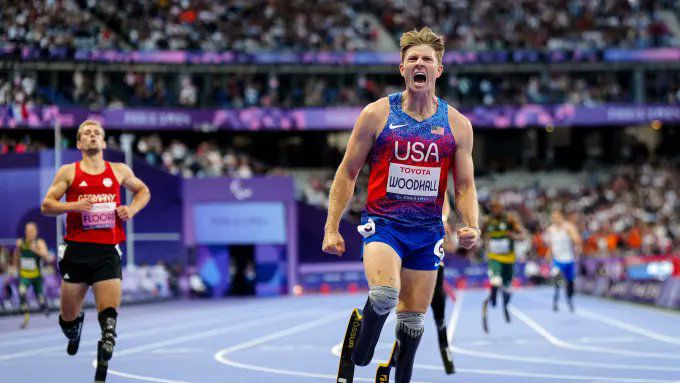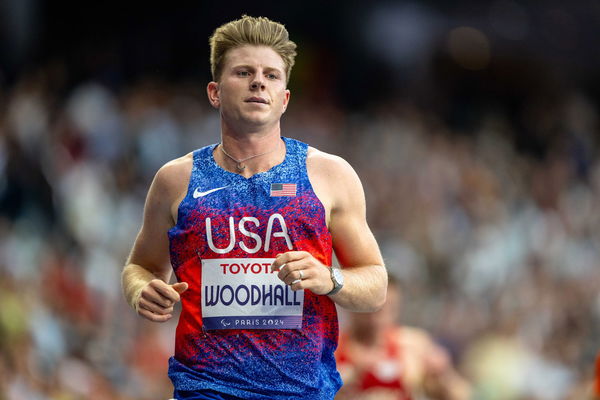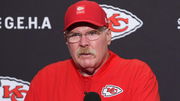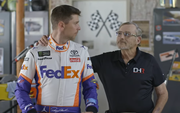

There was a moment in Paris when the cameras caught Hunter Woodhall exhaling, not in relief, but in resolve. Gold in the men’s 400m T62. Bronze in the universal relay. A performance that sealed his place atop the Paralympic ranks and yet hinted at something unfinished. For all the medals and records, Woodhall’s story remains tethered to a chapter many forgot, but he never could. In 2023, Woodhall’s prosthetic leg fractured, sidelining him during a pivotal stretch of his career. The injury was more than a physical setback. It tested his patience, his adaptability, and his philosophy toward competition.
Watch What’s Trending Now!
By the time he returned to the track in Kobe for the 2024 World Para Athletics Championships, claiming silver in both the 100m T64 and 400m T62, he had already recalibrated what success meant. The victories, as significant as they were, reflected something deeper: the reclamation of control.
Now, as he explains the intricacies of competing with prosthetics, it becomes clear that Woodhall’s preparation extends far beyond sprints and splits. “There is so many like little things that will make a big difference in prosthetics,” he said, speaking candidly at the USATF Press conference about the day-to-day adjustments required just to toe the line.
ADVERTISEMENT
“I used to think of prosthetics as just like an addition to what I’m doing. And now we’ve turned it to like how can we use the prosthetics as like the vehicle to like find the success, right? I’m starting to see myself as the driver, and the legs as my car.” That perspective shift, from viewing the legs as tools to treating them as integral to performance, has become central to his return. The technical details, socks, volume, angle, and balance are painstaking, and the stakes are high. “At pre I was running with a cast on my leg and here at USA’s I’ll be running with a cast on my leg. Just trying to prevent things like in 2023 when my leg broke,” he added.
Yet, what defines Woodhall is neither the setbacks nor the medals. It is his capacity to articulate the quiet burdens of a Paralympian’s life. “The hard part is getting out of bed and dealing with everything that comes along with having a physical disability and trying to live life in a world that’s not really made for people like that,” he remarked. The sentiment is not bitter, only exact. The grind that precedes the race often goes unseen, but for athletes like Woodhall, it determines everything.

Imago
Paralympics Para Leichtathletik Paris, 02.09.2024 Hunter Woodhall of United States an den Paralympic Games Para Leichtathletik im Stade de France in Paris, am Montag, 2. September 2024. *** Paralympics Para Athletics Paris, 02 09 2024 Hunter Woodhall of United States at the Paralympic Games Para Athletics at the Stade de France in Paris, on Monday, September 2, 2024 Copyright: xBEAUTIFULxSPORTS/TobiasxLacknerx
With his wife Tara Davis-Woodhall, an Olympic long jump gold medalist, by his side, the couple now represents more than their podium finishes. They are, quite literally, the first Olympic-Paralympic golden pair. And yet, even in this shared spotlight, Woodhall’s focus remains personal. The American record holder in the 100m T62 knows he is not merely outrunning the field. He is steering the vehicle of his own making, cautious, calculated, but no longer looking back.
ADVERTISEMENT
ADVERTISEMENT
Hunter Woodhall’s broken leg, broken dream, and the comeback that changed everything
Hunter Woodhall sat hunched on the track, the race he had trained for slipping away while the crowd in Paris watched others run. A loose bolt on his prosthetic, missed during warmups, had turned decisive. He had crouched into the blocks to rehearse his start, only for the prosthesis to give way beneath him. In that instant, his final in the 400 meters at the 2023 World Para Athletics Championships dissolved into dismay. As competitors advanced to their marks, Woodhall was left slumped near the lane marker, shoulders drooping, overwhelmed by the cruel precision of timing. It was not the injury that hurt most, but the withdrawal moments before the gun that cut deepest.
His wife, Tara, had seen enough. She ran to him without hesitation, meeting him on the blue surface of Stade Charléty. There was no consoling him, only accompanying him in the stillness of disappointment. She held his head. She stayed by his side. “Tara was on the side of the track waiting for me,” he recalled. “She was right there with me. Got me back on my feet, literally, to get to where I am.” That embrace, given in silence while the event proceeded without him, became the starting point for a different kind of ascent, one rooted in partnership, recovery, and a sharper form of discipline.
Top Stories
Andy Reid Announces Decision on Leaving Chiefs on Monday, Days After Playoff Elimination

Jon Rahm Receives Fresh Warning After Brooks Koepka Quit LIV Golf Abruptly: ‘In the Worst Spot’

Sources: Raiders to Fire Pete Carroll After Chiefs Game; Tom Brady Holds Say on John Spytek’s Future

LeBron James Stats on His Birthday: How NBA Icon Has Performed on December 30th

“Nothing Lasts Forever”: Israel Adesanya Opens Up on Overcoming Suicidal Thoughts

Denny Hamlin Faces Unthinkable Loss After Tragic House Fire on Parent’s 52nd Anniversary Night

In the months that followed, Woodhall removed the allowances he had previously permitted himself. The margin for shortcuts dissolved. He challenged the approval process for new prosthetics, won the clearance, and recommitted to the labor of elite competition. “It’s vulnerable to give everything,” he admitted, referring to the risk of offering your full effort and discovering it might fall short. But in Paris, once again, one year later, he returned, this time to finish. This time, to win.
ADVERTISEMENT
ADVERTISEMENT
ADVERTISEMENT
ADVERTISEMENT

